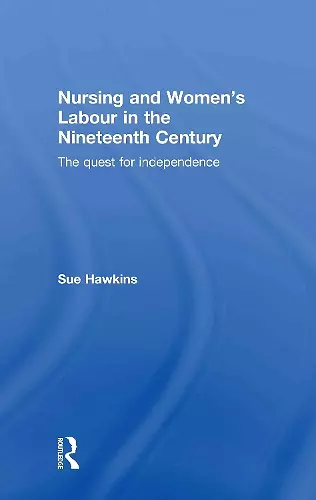Nursing and Women’s Labour in the Nineteenth Century
The Quest for Independence
Format:Hardback
Publisher:Taylor & Francis Ltd
Published:24th Mar '10
Currently unavailable, and unfortunately no date known when it will be back
This hardback is available in another edition too:
- Paperback£49.99(9780415539746)

This book presents a new examination of Victorian nurses which challenges commonly-held assumptions about their character and motivation. Nineteenth century nursing history has, until now, concentrated almost exclusively on nurse leaders, on the development of nursing as a profession and the politics surrounding registration. This emphasis on big themes, and reliance on the writings of nursing’s upper stratum, has resulted in nursing history being littered with stereotypes. This book is one of the first attempts to understand, in detail, the true nature of Victorian nursing at ground level.
Uniquely, the study views nursing through an economic lens, as opposed to the more usual vocational focus. Nursing is placed in the wider context of women’s role in British society, and the changing prospects for female employment in the high Victorian period. Using St George’s Hospital, London as a case study, the book explores the evolution of nurse recruitment, training, conditions of employment and career development in the second half of the nineteenth century. Pioneering prosopographical techniques, which combined archival material with census data to create a database of named nurses, have enabled the generation – for the first time – of biographies of ordinary nurses.
Sue Hawkins’ findings belie the picture of nursing as a profession dominated by middle class women. Nursing was a melting pot of social classes, with promotion and opportunity extended to all women on the basis of merit alone. This pioneering work will interest students and researchers in nursing history, the social and cultural history of Victorian England and women’s studies.
'The book is produced to a high standard. Each chapter is followed by a fascinating one-page pen portrait of a nurse whose life story Dr Hawkins has reconstructed. The absorption of such accounts (or extracts from them) into the text would have further animated the argument, which is well supported by graphs and occasional illustrations.' - Anne Borsay, Medical History Journal
'Sue Hawkins has produced an important addition to nursing history, which demonstrates persuasively the benefits of engaging with the broader historical context.' - Anne Borsay, Medical History Journal
"Trained historians like Hawkins are bringing new perspectives, new questions, and new methods to bear on issues that the history of nursing is uniquely positioned to address.' - Patricia D’Antonio, Nursing History Review
'This bookis, in the end, only about one group of women—those of St. George’s. They are a fascinating group, many of whom, with Hawkins’ new questions and techniques, come across as fully developed individuals with lives before, during, and after training. At this point, we do not know how reflective they and their experiences are of women who trained in other London hospitals, such as Guy’s or St. Bartholomew’s, or those who trained in smaller and different kinds of hospitals throughout England. However, we do now know the strengths of microhistory and the value of census data in allowing us to access the lives of women who chose to work as nurses." - Patricia D’Antonio, Nursing History Review
ISBN: 9780415551694
Dimensions: unknown
Weight: 600g
240 pages